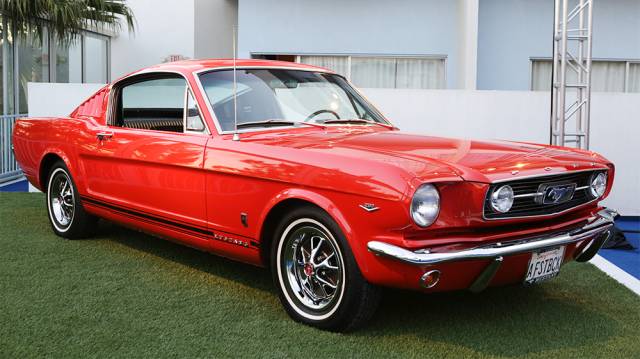
 The Ford Mustang is the embodiment of traditional American values. As such, its place at the forefront of the American auto industry and popular culture has been well cemented over the last 50 years. So how do you approach the redesigning of such a beloved automotive icon? This is what incites David Gelb's A Faster Horse. The launch of the 2015 Mustang is a mere 12 months away at the start of the documentary, and we're introduced to several key players at Ford who are tasked with taking the car from concept to metal.
The Ford Mustang is the embodiment of traditional American values. As such, its place at the forefront of the American auto industry and popular culture has been well cemented over the last 50 years. So how do you approach the redesigning of such a beloved automotive icon? This is what incites David Gelb's A Faster Horse. The launch of the 2015 Mustang is a mere 12 months away at the start of the documentary, and we're introduced to several key players at Ford who are tasked with taking the car from concept to metal.
A Faster Horse is actually two documentaries in one – cutting back and forth between the 2015 project and a general history of the Mustang. At times, this disrupts the flow of each narrative individually, and some of the transitions between narratives are a little confusing. That being said, this framing device helps us understand the enormous pressure put on the chief engineers, and ups the stakes for this 2015 release. Pressure is certainly the operative word, here, and the most striking thing about A Faster Horse is how it conveys this through sound and image. Time lapses of assembly lines and abrasive synthesizers work nicely together to support the urgency of the narrative, and the methodical nature of the process.
All in all, there is a lot of attention directed to the possibility of failure. This unease is incrementally piled on across the entire film; there is brief mention of the 2008 auto crisis, mainly to shore up the intensity of the situation and how thousands of jobs are potentially at stake. Also highlighted, is the utter market failure of Ford's "Edsel" campaign – which was specifically included to emphasize why engineers and designers are often fearful of taking risks. The payoff to all of this isn't all that surprising; in spite of numerous errors and miscalculations, these engineers are able to cross the finish line with a vehicle that they're proud of, and have an emotional relationship with.
The real interesting thing about A Faster Horse, however, has nothing to do with interchangeable parts. The final leg of the film takes special effort to show everyday Mustang-owners celebrating the 50th anniversary of the car. Often, we're lectured about the dangers of materialism and consumerism and the effect it can have on our own humanity. What Gelb's film does really well, is showcase how this obsession with the Mustang line doesn't have to be about American consumerism. The consumers Gelb interviews aren't drawn to this particular car because of status or flash, they see it as a reflection of themselves. In a strange way, the film is showcasing a family of Mustang owners and creators. Gelb seems to argue that the design process for the Mustang (or perhaps, the automotive industry at large) is its own form of art. Objectively, it's easy for a celebration of an inanimate object on this scale to seem foolish. A Faster Horse isn't groundbreaking, but it does help explain why this isn't the case.